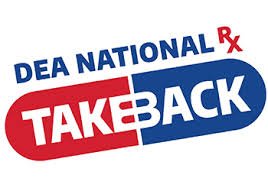The Barton County Sheriff’s Office will team up once again this year with the Barton County Health Department and the United States Drug Enforcement Agency to help individuals and organizations safely dispose of their unused prescription medications. This year’s Drug Take Back Day will be held Saturday, April 30, on the east side of the Barton County Courthouse, 1408 Kansas Ave., from 10 a.m. to 2 p.m. Both prescription and non-prescription medicines will be accepted.
The DEA permits local law enforcement to accept medications for destruction once a year. This can include both prescription and over-the-counter medicines individuals wish to have disposed.
Two of the main goals, according to Barton County Sheriff Brian Bellendir, are to prevent abuse of prescription drugs and to allow for proper disposal. Representatives will accept drugs from private citizens as well as institutions such as nursing homes and long-term care facilities that may need to dispose of any controlled substance. Barton County Health Director Karen Winkelman said used hypodermic needles are also accepted as long as they are in a sealed hard-structured container. There is no fee for the service.
Winkleman said medications will be deposited into a large container with law enforcement present, and the contents of the container will be sealed shut, locked and safely incinerated at a DEA-specified site. Because of this, medications do not have to be taken out of containers or have labels removed prior to disposal, and citizens do not have to worry about their personal information being exposed.
Drug misuse is widespread
According to the 2020 National Survey on Drug Use and Health, published in October 2021, 16.1 million people had misused controlled prescription drugs in the past year, including prescription pain relievers, stimulants, tranquilizers and sedatives. Of those, prescription pain relievers were the most commonly misused, having been misused by 9.3 million people. Another 5.1 million people misused prescription stimulants, and 4.8 million people misused prescription tranquilizers or sedatives.
The percentage of prescription drug use was highest among young adults aged 18 to 25 (9.5% or 3.2 million people), followed by adults aged 26 or older (5.6% or 12.2 million people), then by adolescents aged 12 to 17 (2.8 percent or 688,000 people), according to the report. Winkelman said there is a high risk of overdose with misused prescription medication.
Winkelman said improperly used prescription medications can be as dangerous, or more dangerous, than illegal drugs. When unused medications are not properly disposed of, there is a high risk they can wind up in the hands of those who seek to misuse or sell them.
Drug Take Back Day events have been held 21 times in the last 12 years. In Barton County alone, Winkleman said more than 2,300 pounds of medications have been collected at the events since 2016.
In the area, the Rush County Sheriff’s Office, 715 Elm St., La Crosse, and the Sterling Police Department, 118 N Broadway Ave, Sterling, are also listed as a drop-off sites. Other locations can be found at www.ag.ks.gov by clicking “Drug Take Back Day” button under the “Quick Links” heading.
Year-round disposal
Unused prescriptions can be turned in year-round at many local law enforcement locations, including the Barton County Sheriff’s Office. Residents should call the BSCO, 620-793-1876, for more information.
If you are not able to make it to Drug Take-Back Day and you need to dispose of unused medications, Winkelman said do not flush medications down the toilet, as that results in medications entering the water supply. The Health Department keeps special packets on hand that are specifically designed for disposing of medication. They also keep a container on hand to allow citizens a means of safely disposing of their unused medications. These services are available at the health department during normal business hours.





